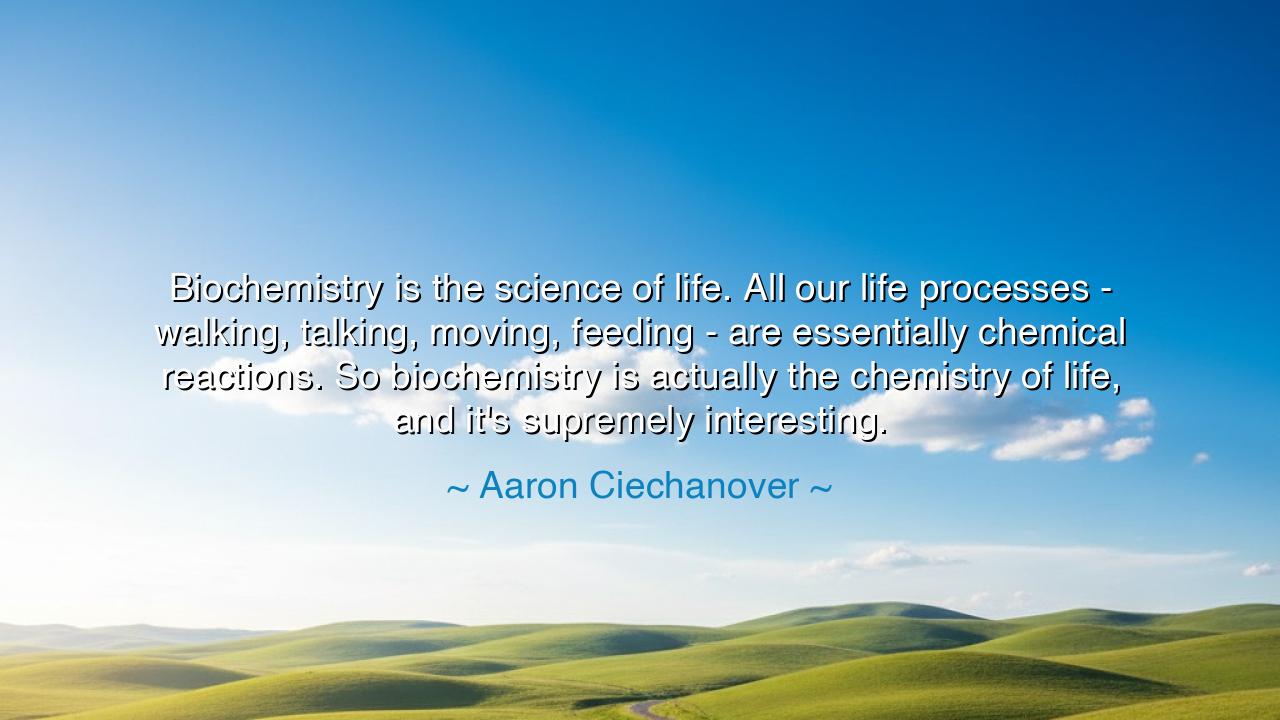
Biochemistry is the science of life. All our life processes -
Biochemistry is the science of life. All our life processes - walking, talking, moving, feeding - are essentially chemical reactions. So biochemistry is actually the chemistry of life, and it's supremely interesting.






"Biochemistry is the science of life. All our life processes - walking, talking, moving, feeding - are essentially chemical reactions. So biochemistry is actually the chemistry of life, and it's supremely interesting," proclaimed Aaron Ciechanover, a man whose understanding of the intricate web of life’s mechanisms has illuminated the deepest secrets of our existence. These words resonate with the truth that life itself is not just a series of biological events but a symphony of chemical reactions, an orchestra of atoms and molecules that harmonize in ways both delicate and powerful. To understand biochemistry is to understand the very essence of life, for it is through these molecular processes that our bodies move, think, and breathe. The study of biochemistry is not merely an academic pursuit, but a revelation of the profound connection between science and the human experience.
Consider the ancient wisdom of Hippocrates, who first recognized the interconnectedness of the body and its processes. He spoke of the humors—the bodily fluids believed to influence health and behavior. In his time, the inner workings of the body were seen as mysterious and unknowable. Yet even then, the wise understood that the body's health was linked to a delicate balance. Today, we know that those so-called humors are, in fact, chemical reactions—enzymes breaking down food, molecules circulating through blood, signals firing across neurons. Life, as Ciechanover so aptly stated, is a constant dance of chemistry—a sacred balance of molecules in constant motion, endlessly working to maintain the harmony that sustains us.
The path from ancient mysticism to the modern science of life was long and arduous. Only in recent centuries did the veil of ignorance lift, revealing the chemical processes that power life itself. Take, for example, the discovery of DNA. It was the work of scientists like James Watson, Francis Crick, and Rosalind Franklin that uncovered the very code of life—the molecular language that dictates how living beings are built and how they function. Yet, at its core, this discovery was simply the unlocking of chemical secrets, a revelation of how biochemistry governs our very existence. From the moment of birth to the last breath, every action, every thought, every movement is governed by chemical reactions that work in unison, creating the miracle that is life.
In the ancient days, the secrets of life were hidden in the mystical and the divine, with alchemy seeking to turn base metals into gold and elixirs promised to grant eternal life. Yet, the pursuit of alchemy was not without merit. It led to the discovery of many key principles that would later become the foundations of modern science. The ancient alchemists, in their search for understanding, were unwittingly laying the groundwork for the biochemistry that we now know to be the true essence of life. Through centuries of trial, error, and revelation, the ancient quest for immortality eventually gave way to the pursuit of understanding how life is constructed, how it thrives, and how it falters when those delicate molecular reactions go awry.
One of the most striking examples of the power of biochemistry in action is the story of insulin. For centuries, those with diabetes suffered from an ailment that seemed destined to shorten their lives. But in the early 20th century, Frederick Banting and Charles Best unlocked the chemical processes that produce insulin in the body. This humble molecule, once simply a biochemical curiosity, was revealed to be the key to managing the disease. Thanks to their groundbreaking work, lives were saved, and the understanding of biochemistry in the context of human health grew immensely. The lesson here is clear: the chemistry of life is not a distant, abstract science. It is profoundly personal, influencing not just the theoretical world of academics but also the very fabric of human existence.
Thus, the lesson to be drawn from Ciechanover’s words is this: biochemistry is not merely the study of molecules and reactions—it is the study of life itself. Every thought, every breath, every heartbeat is a testament to the miracles of chemistry that unfold within us. The chemical reactions that allow us to speak, to walk, to feed, are not isolated phenomena but are deeply interconnected, each one influencing the other in a delicate web of life. This understanding challenges us to take a deeper look at our bodies, to see them not as mechanical objects but as complex, living systems, intricately designed to thrive and function in harmony.
In our own lives, we must remember that biochemistry is more than just a field of study. It is the key to understanding the profound interconnectedness of life. It teaches us that the body is not a mere vessel but a symphony of molecules, each playing its part in the great dance of existence. As we face the challenges of our modern age, let us be guided by this wisdom, knowing that through the study of biochemistry, we can not only unlock the secrets of life but also use that knowledge to live in greater harmony with the world around us. Let us honor the chemical marvels of our existence, for they are the very essence of life—and in understanding them, we come closer to understanding ourselves.






AAdministratorAdministrator
Welcome, honored guests. Please leave a comment, we will respond soon